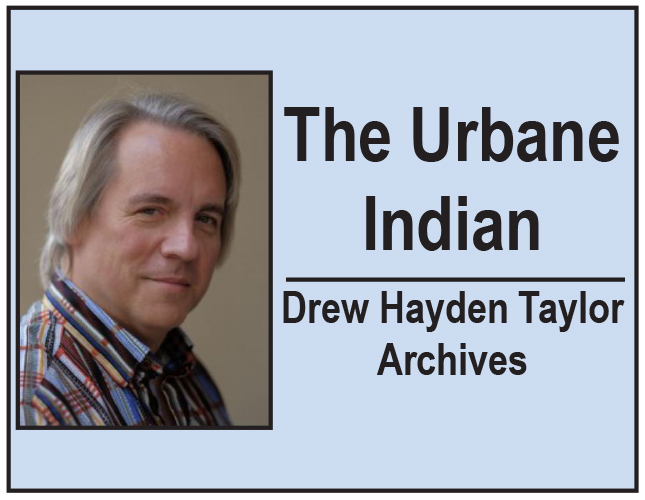
By Drew Hayden Taylor
Originally published in August 2015
Canada and America are two different countries, but with similar characteristics. One was born in violence and rebellion, a middle finger extended to King George, while the other was conceived in quiet negotiation, with probably a few ‘I’m sorrys” to Queen Victoria. Over the years, these two step-siblings have grown and manifested themselves in new and different ways.
For one thing, America seems obsessed with killing African American people. Whether we’re talking about Treyvon Marten in Florida, Walter Scott in South Carolina, the guy selling cigarettes in New York City, the incident in Ferguson, Missouri or the recent Charleston Church shooting, to name just a few, being a black man in America can be hazardous to your life.
North of that imaginary border, being Native in Canada can also be hazardous to your health. The only real difference within the tentacles of this country is, broadly speaking, it appears Canada has a conscience… of sorts. With spotty results, Canada, it would seem, is attempting to deal with its compromised morality. To me, it seems like both countries act like they are in an abusive relationship with members of its population.
America began its existence with slavery and seems to be still taking its anger out on an entire population of people who were instrumental in its creation. Today, the abuse still continues in America, with one partner opting quite frequently to mistreat those seeking the American Dream and finding an American Nightmare. Truly a dysfunctional relationship.
Not to be outdone, we in Canada have our own domestic disputes to deal with. In the last few months there has been story after story in the media dealing with Native issues, and Canadian society’s attempt at coming to grips with past injustices.
In Canada, it’s more like a couple in counselling. A lot of bad things were done and said in the past and they are currently in therapy dealing with the after effects. Case in point: The Truth and Reconciliation Commission’s report, detailing the sad summation of a hundred years of forced education in residential schools… or could they be called re-education camps?
Unfortunately, nobody really expects this report to go anywhere, other than your local library. When the report was tabled, Aboriginal Affairs Minister Bernard Valcourt visibly looked like he would rather be the guest of honour at a Mohawk/Jesuit barbeque than to accept the recommendations
There was also the Province of Manitoba’s recent apology for the Sixties Scoop up, when Native kids were taken away by the province and farmed out for adoption to non-Native families; the second salvo at destroying Native culture through children.
Manitoba was the first province to publically acknowledge the damage this practice has and still does cause. Oddly enough, it was often referred to as ‘AIM’ – Adopt Indian/Metis. Add this to the federal government’s residential school apology and the stereotype is true. Canadians do like to say “I’m sorry.”
Yet another National Aboriginal Day (affectionately known as NADs) has come and gone again, with much government funding provided to celebrate those traditions that once were forbidden and illegal. Perhaps the largest collective case of a passive/aggressive condition known to Canada.
Then there’s the almost universal call for a national inquiry into the 1,200 murdered and missing Aboriginal women. That is all except for a select few influential, well educated, affluent white men of power, looking down at us from the top.
Prime Minister Stephen Harper continues to maintain that this situation is more of a criminal issue, not so much a social one in dire need of investigation. The irony here being that when you have 1,200 Native women doing the same thing collectively, it would normally immediately get researched and studied by a whole plethora of sociologists and academics as an important social trend.
A good reason why economist politicians should never become cops.
Next on the list of past assault anniversaries to be commemorated was July 11. This was the 25th anniversary of Oka, or more accurately, Kahnasatake.
It’s estimated that half the Native population is under 25. So almost 50 per cent of Canada’s Aboriginal population wasn’t born when this happened. Sometimes kids never know what their parents used to do. So, even though we have all these “I’m sorrys”, there is still a lot of work to do.
As in any abusive relationship, an apology is a good beginning, but it’s not the end. Anybody can say they are sorry. It’s what you do to follow up on that action that shows real healing.
I don’t think anybody wants a divorce.
